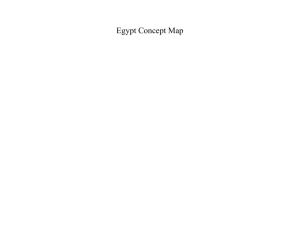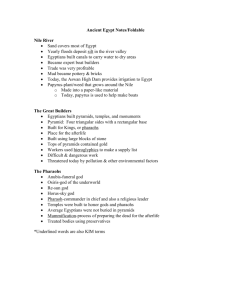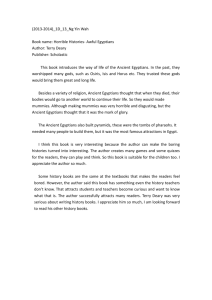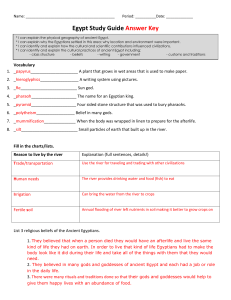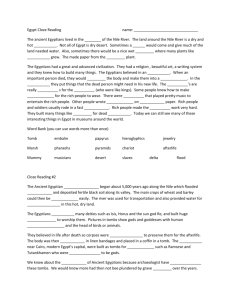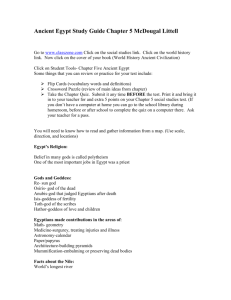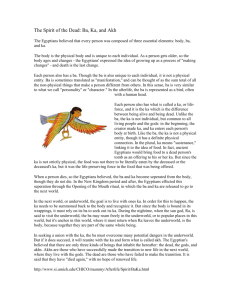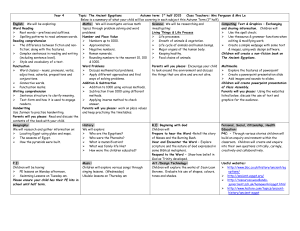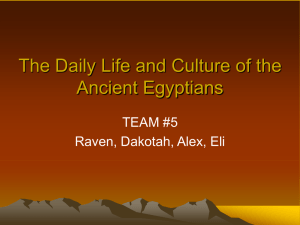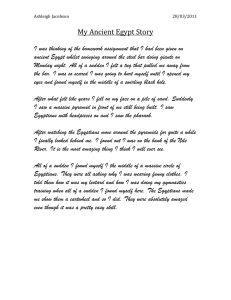Chapter 5 - Lesson 2 notes “Life in Ancient Egypt”
advertisement
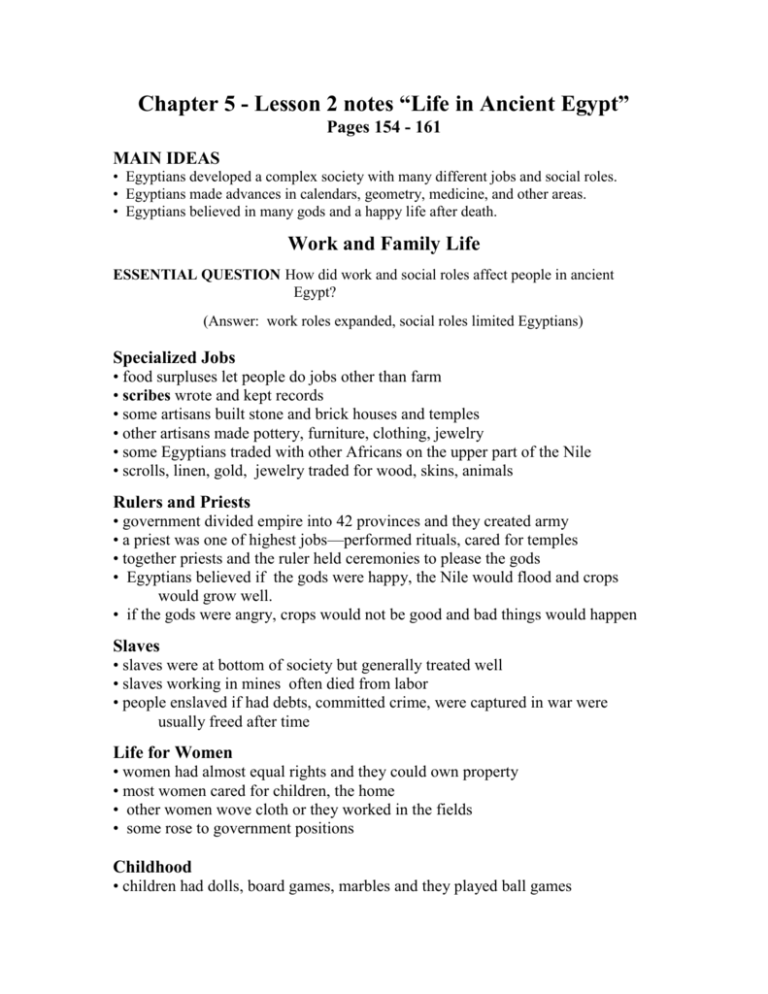
Chapter 5 - Lesson 2 notes “Life in Ancient Egypt” Pages 154 - 161 MAIN IDEAS • Egyptians developed a complex society with many different jobs and social roles. • Egyptians made advances in calendars, geometry, medicine, and other areas. • Egyptians believed in many gods and a happy life after death. Work and Family Life ESSENTIAL QUESTION How did work and social roles affect people in ancient Egypt? (Answer: work roles expanded, social roles limited Egyptians) Specialized Jobs • food surpluses let people do jobs other than farm • scribes wrote and kept records • some artisans built stone and brick houses and temples • other artisans made pottery, furniture, clothing, jewelry • some Egyptians traded with other Africans on the upper part of the Nile • scrolls, linen, gold, jewelry traded for wood, skins, animals Rulers and Priests • government divided empire into 42 provinces and they created army • a priest was one of highest jobs—performed rituals, cared for temples • together priests and the ruler held ceremonies to please the gods • Egyptians believed if the gods were happy, the Nile would flood and crops would grow well. • if the gods were angry, crops would not be good and bad things would happen Slaves • slaves were at bottom of society but generally treated well • slaves working in mines often died from labor • people enslaved if had debts, committed crime, were captured in war were usually freed after time Life for Women • women had almost equal rights and they could own property • most women cared for children, the home • other women wove cloth or they worked in the fields • some rose to government positions Childhood • children had dolls, board games, marbles and they played ball games • children of wealthy Egyptians went to schools; most learned parents’ jobs • almost all children were married in their early teen years. REVIEW QUESTION: What were the levels of Egyptian society? ( Answer: pharaoh, priests, scribes, merchants & crafts people, farmers, laborers and slaves.) Expanding Knowledge ESSENTIAL QUESTION How did learning advance in ancient Egypt? (Answer: new ideas & techniques in astronomy, geometry, medicine & writing.) Astronomy • priests studied world to find ways to please gods • some advances came from practical discoveries • priests studied sky for religious reasons • used 365-day cycle of star to create first practical calendar • star used now called Sirius Geometry • surveyors used knotted rope to mark boundaries washed out by floods • geometric shapes were sacred, used in design of temples and monuments Medicine • doctors prepared bodies for burial, knew body parts • performed some of first surgeries • some specialized in herbal medicines • believed that heart controlled thought, brain circulated blood Hieroglyphs • hieroglyphs—pictures that stand for different words, sounds • in use from 3000 B.C., writing system started with 700 characters • grew to include over 6,000 symbols • papyrus—paper-like material from papyrus reed • pressed, rolled into scrolls; light, easy to carry • used to create some of the first books REVIEW QUESTION: What advances in learning did the Egyptians make? (Answer: calendar w/ 365 days, developed accurate surveying methods, learned to use herbs for medicine, developed a writing system, and learned to make papyrus) Beliefs and Religion ESSENTIAL QUESTION; What religious beliefs did Egyptians hold? (Answer: many gods, a happy life after death) Life After Death • Egyptians along the Nile had positive view of life • the Nile’s black land provided for most of their needs • Egyptians believed gods favored them, believed in happy afterlife • afterlife—life believed to follow death • other cultures, such as Sumerians, thought afterlife was miserable Many Gods • Polytheism—belief in many gods • Egyptian gods included those of afterlife, nature • Re was sun god, later called Amon-Re• Osiris was a god who judged Egyptians after death • Isis was a fertility goddess, Osiris’ wife • Anubis was a god of the dead Making Mummies • dead bodies embalmed so people would have their bodies in afterlife • embalm—to preserve a body after death • removed all organs but heart, filled body with salt, herbs • created mummy—a body dried so it won’t decay • dried body wrapped in linen strips; process took about 70 days • put in coffin in tomb with everyday objects for use in afterlife REVIEW QUESTION: What did the Egyptians think happened after death? (Answer: believed they would be judged & then lead a life in another world) Lesson Summary • The Egyptians developed a calendar, early geometry, medical knowledge, and hieroglyphic writing. • Ancient Egypt had a complex society with specialized jobs. Women and slaves lived better there than in many other ancient lands. • The Egyptians believed in many gods related to nature and a happy afterlife. Why It Matters Now . . . The ancient Egyptians were the first people known to develop a formal religion based on a belief in the afterlife. Such a belief is part of most religions today.
